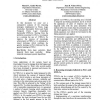5114 search results - page 68 / 1023 » Learning for Evolutionary Design |
136
click to vote
CONNECTION
2004
15 years 2 months ago
2004
The Artificial Life approach to Evolutionary Robotics is used as a fundamental framework for the development of a modular neural control of autonomous mobile robots. The applied e...
129
click to vote
ICML
2003
IEEE
15 years 7 months ago
2003
IEEE
The links between genetic algorithms and population-based Markov Chain Monte Carlo (MCMC) methods are explored. Genetic algorithms (GAs) are well-known for their capability to opt...
123
click to vote
EUSFLAT
2001
15 years 3 months ago
2001
In this document we cany out a comparative analysis of the reasoning strategies implemented in Fuzzy Logic Controllers (hereinafter FLCs) and Faded Temporal Fuzzy Logic Controller...
123
click to vote
GECCO
2005
Springer
15 years 8 months ago
2005
Springer
Any computational approach to design, including the use of evolutionary algorithms, requires the transformation of the domain-specific knowledge into a formal design representatio...
126
click to vote
GECCO
2006
Springer
15 years 6 months ago
2006
Springer
1 Learnable Evolution Model (LEM) is a form of non-Darwinian evolutionary computation that employs machine learning to guide evolutionary processes. Its main novelty are new type o...

